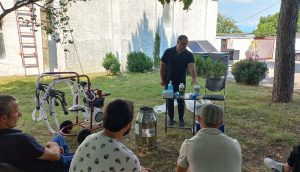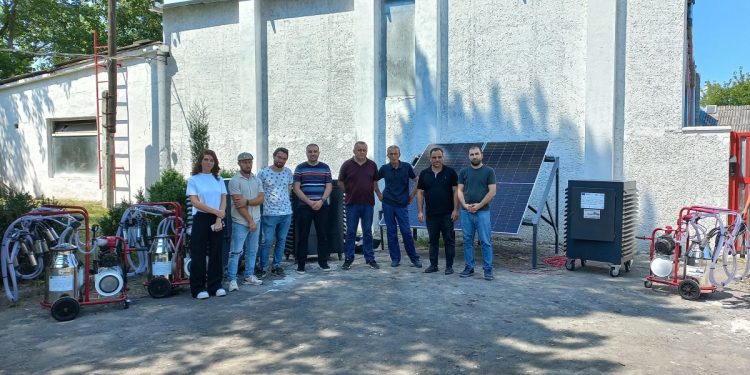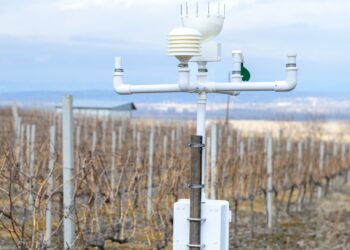In the picturesque highlands of Tusheti, a unique culinary tradition faces significant challenges. Tushuri Guda cheese, celebrated for its rich flavor and local heritage, is produced exclusively in this region. To gain insight into EU-supported efforts that focus on climate-friendly innovation and support for sustainable agriculture, we spoke with Vakho Kadagidze, Project Manager at the Tusheti Development Fund – an organization that won the EU-funded small grants competition held within CENN’s Climate Action Project.
Focusing on Local Heritage
When asked what prompted the initiative to support Tushetian Guda cheese, Kadagidze explained, “Tushetian Guda cheese is well known throughout Georgia. However, the production has been decreasing each year due to a diminishing number of participating farmers.” This decline poses a threat not only to the cheese itself but also to the cultural identity of the region. The highland areas of Tusheti are characterized by their breathtaking landscapes and rich traditions, and Guda cheese is an integral part of that heritage.
Kadagidze highlighted that many farmers still use traditional methods, ensuring the cheese’s authenticity. “These methods have been passed down through generations,” he said. Yet, with ongoing challenges—such as nomadism, labor shortages, and poor infrastructure—the future of this artisanal cheese is at risk. “These challenges led to the initiative “Introduction of renewable energy sources and improvement of food safety standards in Tushetian Guda cheese production”, which aimed to equip farmers with essential tools and climate-smart agricultural technologies. By promoting sustainable practices, the fund supported the adaptation of Guda cheese production to meet food safety standards, while also enhancing resilience to climate impacts and reducing the environmental footprint of local farming activities,” he noted.

A Competitive Approach for EU-Funded Sustainable Practices
To support local farmers, the Tusheti Development Fund launched an open EU-funded competition aimed at identifying those most committed to continuing the tradition of Guda cheese production. “Initially, we received a limited response,” Kadagidze recounted. “We had to re-engage with farmers to keep their interest alive.” This proactive approach proved fruitful, as they ultimately received 12 applications.
The selection criteria were rigorous, with the commission prioritizing experience in Guda cheese production. “We wanted to ensure that the farmers chosen not only had the skill but also a connection to the land and the traditions of Tusheti,” Kadagidze explained. Additionally, “Priority was also given to women and young farmers, as they need the most encouragement and support.” This focus on inclusivity is essential for the sustainability of the industry, as Kadagidze believes that empowering women and youth can lead to innovative practices that benefit the entire community. Finally, as a result of competition, 3 farmers were selected. Selected farmers were given mobile solar power plants and 2-system milking machines. As there is no electricity supply in Tusheti, mobile solar power stations will allow farmers to use milking machines smoothly, which will simplify their work on the one hand and make the milking process compliant with modern standards on the other hand.
Empowering Women and Youth Through Climate-Smart Farming
Kadagidze emphasized the importance of involving women and young people in farming. “Engaging youth is vital for ensuring the sustainability of the field,” he said. “Their success with innovative technologies is crucial for the future of Guda cheese production.” This emphasis aligns with the EU’s goal of fostering inclusive and sustainable agricultural practices in Georgia.
The involvement of women is equally important. “Women play a key role in the production process,” Kadagidze noted. “They are often the ones who manage the day-to-day operations and maintain the quality of the cheese.” By supporting women in these roles, the Tusheti Development Fund aims to create a more balanced and resilient agricultural sector.
When discussing the future of Tusheti farming, Kadagidze remarked, “Engaging and encouraging youth is essential for the preservation of Tushetian Guda cheese and sustainable development.” He stressed that current trends show fewer young people interested in farming, making supportive projects vital. “If we don’t take action now, we risk losing not just the cheese but the entire cultural landscape that surrounds it,” he warned.
The Tusheti Development Fund’s initiatives are designed to motivate young people to participate in traditional farming. Through workshops, training sessions, and hands-on demonstrations, the Fund is working to bridge the gap between tradition and innovation.
Enhancing Quality and Safety
Kadagidze stated, “While Guda cheese operates under simplified food safety regulations, the inclusion of modern techniques helps farmers meet market demands.” He believes that improved sanitary conditions will benefit the cheese’s quality and safety, driven by the climate-smart technologies funded by the EU to support sustainability.
The integration of milking machines and mobile solar power is a key advancement. “These machines enhance milking efficiency while aligning with EU standards for climate-friendly technology,” Kadagidze explained. This innovation helps ensure compliance with food safety standards.

Adapting to Climate-Smart Technologies
The Tusheti Development Fund has introduced EU-funded technologies, including mobile solar power plants and milking machines. “This year, we are testing them seasonally, and starting next summer, we plan to hold a demonstration day on these farms, showcasing how the equipment works,” Kadagidze explained. This hands-on approach builds confidence among farmers in using new technologies that are both climate-conscious and resource-efficient.
Kadagidze emphasized that this equipment is portable and can be utilized in winter pastures, addressing the lack of electricity in some areas. This aligns with the EU’s broader mission to support renewable energy solutions in agriculture, reducing the carbon footprint of farming activities in Tusheti.
Long-Term Impact and EU’s Vision for a Climate-Friendly Future
Finally, Kadagidze discussed the broader implications of improving food safety standards for Guda cheese producers. “Enhanced standards make it a more sought-after product,” he said. These improvements, made possible by EU support, not only help individual farmers but also contribute to Tusheti’s environmental sustainability and economic growth.
“By integrating modern technologies into production, we streamline processes and reduce costs, benefiting the local economy,” Kadagidze noted. As Guda cheese gains recognition beyond its local roots, the potential for growth is substantial. “We envision a future where Tushetian Guda cheese is celebrated not just in Georgia but around the world,” he concluded.
Vakho Kadagidze’s insights highlight the Tusheti Development Fund’s commitment to preserving a cherished tradition while adapting to modern challenges. With continued support and innovation, the future of Tushetian Guda cheese looks promising, ensuring that this unique culinary heritage remains alive for generations to come. As Kadagidze and his team work tirelessly to bridge the gap between tradition and modernization, they embody the hope for a sustainable future in Tusheti’s farming landscape.
Since 2021, CENN has been implementing a four-year project, the Georgia Climate Action Program, with the financial support of the European Union. The project is being carried out in four target regions: Kakheti, Imereti, Guria, and Racha-Lechkhumi, and its aim is to increase civil society engagement in the development and implementation of climate change policies.
As part of the project, CENN announced the competition for the innovative ideas on climate change mitigation and adaptation. The Tusheti Development Fund is one of the winners, implementing a 9,000 EURO initiative for climate mitigaton.














